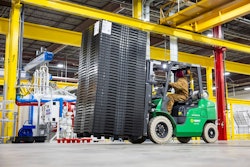
Ninety-five percent of manufactures are investing in AI to navigate uncertainty and accelerate smart manufacturing, according to Rockwell Automation’s 10th annual “State of Smart Manufacturing Report.”
“Today's technology advancements are unlocking new opportunities where the combined potential of people and technology will shape our collective future,” says Blake Moret, chairman and CEO, Rockwell Automation. “As this year’s report shows, manufacturers around the world are using smart manufacturing to navigate disruption and create new opportunities for speed and agility. At Rockwell, we believe innovation and resilience go hand-in-hand. With the right technology and right people, we can simplify complexity and lead with confidence during times of dynamic change.”
Key takeaways:
• 81% of manufacturers say external and internal pressures are accelerating digital transformation, with cloud/SaaS, AI, cybersecurity, and quality management ranking as the top areas of smart manufacturing technology investments.
• 95% of manufacturers have invested in or plan to invest in AI/ML over the next five years.
• Organizations investing in generative and causal AI increased 12% year-over-year, signaling a maturing approach to advanced technologies beyond experimentation.
• Cybersecurity ranks as the second biggest external risk, with 49% of manufacturers planning to use AI for cybersecurity in 2025, up from 40% in 2024.
• 48% of manufacturers plan to repurpose or hire additional workers due to smart manufacturing investments. Additionally, 41% are using AI and automation to help close the skill gap and address labor shortages.
• Quality control remains the top AI use case for the second year in a row, with 50% planning to apply AI/ML to support product quality in 2025.
· Beyond these data points, the report reflects broader movement towards more efficient and adaptive operations. Manufacturers are using smart technologies to strengthen supply chains, accelerate sustainability initiatives and make faster, more informed decisions. There has also been a 5% rise in the importance of analytical and AI skills for leaders, showing that talent development and technical innovation must go hand in hand. Still, many manufacturers face challenges when implementing AI.
· Nearly half of respondents say the ability to apply AI is now an extremely important skill, up from just 10% last year.




















